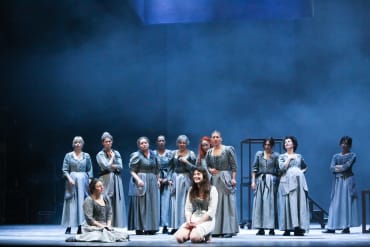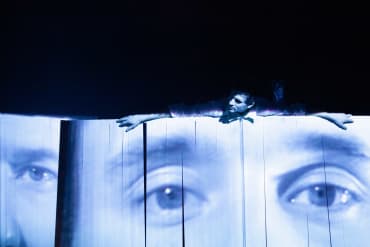SLAVOJ ŽIŽEK
ANTIGONE
Directed by Angela Richter
Co-production of Théâtre de Liège and Emilia Romagna Teatro Fondazione
My idea was simple: handle Sophocles’ version as an individual shard of a broken jug and tessellate it with other shards, in the hope that this process might make it possible to realize some sort of a truth. (Slavoj Žižek)
In his new rendering of a classic theatrical model, Slavoj Žižek reaches for the principle of the triad; meaning: triás – a principle of the trinitarian unity of thesis, antithesis and synthesis. In his version of Antigone, which he outlines as an ethical-political exercise in the manner of Brecht’s didactic pieces, Žižek offers three possible endings for this tragedy, leaving the audience the freedom of deciding the fate of a modern-day Antigone. A thorough analysis of Europe as a contemporary system opens up a view of the Euro crisis—the refugee crisis; Brexit; austerity; the tightening of border controls; the building of fences and isolationism; various infiltrations and the atmosphere of fake news—a view of a world that is threatened by the disintegration of Europe. Slavoj Žižek addresses the issue of which (kind of) Antigone could justly (objectively) judge the circumstances of our time?
It would seem that Antigone oscillates between the two extremes; the traditional and the fundamentalist, unconditionally insisting on the symbolic demand, invoking the customs and ancient laws of the gods.
In this post-political world defined by consensus, could it be that the only possibility of resistance is the traditionalist one (clinging to the past and refusing to accept the inevitability of the new global neoliberal order) or the fundamentalist one? Is rebellion even possible anymore? Angela Richter wants to encourage thought about how it would be possible to reawaken the political spirit in the form of a politics for those who have no voice in this Europe of crisis and upheaval. This world premiere of Žižek's text affirmed the Croatian National Theatre in Zagreb as one of the centers of innovation in European theatre.
SLAVOJ ŽIŽEK (b. 1949) is a Slovenian philosopher and writer. He was born in Ljubljana and has made important contributions to the fields of political theory, film theory and theoretical psychoanalysis. He won international recognition as a social theorist with the publication of his first book The Sublime Object of Ideology, becoming one of the world's most famous intellectuals and philosophers. He is a senior researcher at the Institute for Sociology and Philosophy at the University of Ljubljana and also a professor at the prestigious European Graduate School. As a visiting professor he teaches at a number of most prestigious universities in the United States and England. Antigone is his first dramatic work.
Angela Richter was born in 1970 in Ravensburg. Richter studied theatre directing at the Academy of Music and Theatre in Hamburg, where in 2006 she founded the Fleet Street Theatre, running it until 2010. She also worked as the house director at the Cologne Theatre. She typically uses discussions about topics as the starting point for her work, connecting various media within the theatrical production. In 2014 she scheduled a large scale project with German national TV WDR, dealing with the life and work of digital dissidents and whistleblowers. The staging of Žižek’s Antigone at the CNT in Zagreb is her Croatian directorial debut.














